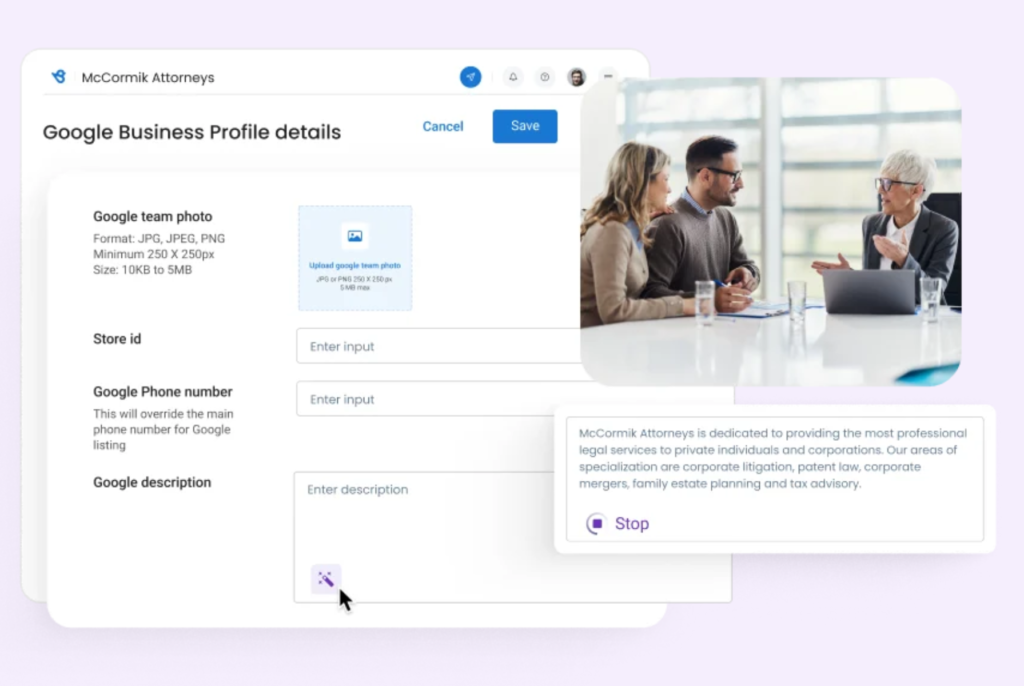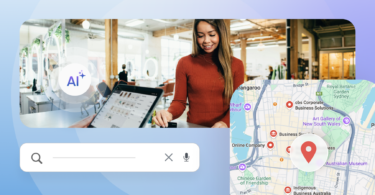Chances are, your local SEO struggles aren’t due to a flawed strategy but rather an outdated approach. You’re manually updating business listings across 50 locations, while your competitors are likely using automation and Artificial Intelligence (AI) to optimize their online presence in real time.
But here’s the twist: throwing AI mindlessly at your local SEO won’t save you either. This guide reveals how you can use AI with human insight to achieve higher rankings on search.
Quick summary: ‣ Gone are the days of manual local SEO - AI is now dominating search results. ‣ Smart business owners use AI automation with human expertise to create unbeatable local SEO strategies. ‣ Birdeye Listings AI is changing the game with AI features that make managing multiple locations super easy. But here’s what you should question: Is AI the only way out? Is manual work extinct now? (Spoiler: No! In this blog, we'll show you exactly where to draw the line between AI automation and human expertise to maximize your results.)
Table of contents
- What is local SEO AI?
- Benefits of optimizing local SEO with AI
- How does Birdeye help in local SEO with AI?
- Should you only rely on AI for local SEO?
- Balancing AI in local SEO with human intelligence
- 5 best AI tools for local SEO
- FAQs on AI for local SEO
- Join 100,000+ businesses using Birdeye to dominate local SEO with AI
What is local SEO AI?
Local SEO AI is the application of artificial intelligence technologies to optimize a business’s local search presence. It includes automated tools that help manage business listings, analyze customer reviews, track local rankings, and identify optimization opportunities across Google Business Profile (GBP) and other local search platforms.
Benefits of optimizing local SEO with AI
Think about your team’s hours updating business listings, responding to reviews, and checking rankings across different locations. AI transforms these time-consuming tasks into automated workflows, giving you back valuable hours to focus on strategy and growth.
Time and resource optimization
Local businesses traditionally spend 15-20 hours weekly managing their online presence. AI automation transforms this workload, cutting management time while improving accuracy. Here’s how AI streamlines your most time-consuming tasks:
- Automated listing management across multiple platforms: Make one update in your dashboard, automatically synced across GBP, Facebook, and 100+ other directories. For example, when a restaurant adds holiday hours, AI ensures consistency across all platforms within minutes, preventing customer confusion and missed opportunities.
- Real-time listing monitoring and correction: AI continuously scans your business listings, comparing data points like phone numbers, addresses, and business hours. When your Boston location’s phone number appears differently on Apple Maps and Google, the system alerts you and can auto-correct these discrepancies, maintaining consistent NAP (Name, Address, Phone) data crucial for local rankings.
- Multi-location management efficiency: For businesses with multiple locations, AI centralizes control. A retail chain can update holiday hours for stores simultaneously while maintaining location-specific details. The system even flags issues, like incorrect store categories or missing attributes, which help in enterprise reputation management.
- Smart review management system: Instead of checking multiple platforms for new reviews, AI aggregates them in one dashboard, categorizes sentiment, and suggests personalized responses based on your past well-received replies. This helps maintain a consistent brand voice while saving hours of manual review management.

Turn data insights into action
Generic data analysis doesn’t cut it for local SEO. AI transforms raw local search data into actionable strategies by focusing on metrics that directly impact your local visibility:
- Local ranking intelligence: Beyond basic position tracking, AI identifies patterns in your local pack rankings across different keywords and locations. When your Denver location drops in rankings for “emergency plumber,” the system alerts you and suggests specific fixes based on successful patterns from your other locations.
- Competitive edge through AI analysis: The system does local competitors’ analysis, detecting changes in their business hours, services, or review patterns. When a competitor adds a new service category or receives a surge of reviews, you’re instantly notified to adjust your strategy.
- Deep review insights: AI analyzes review content beyond star ratings, identifying specific mentions of products, services, or experiences. For example, a restaurant might discover that while its food receives praise, parking complaints appear frequently, highlighting an operational issue affecting its local SEO performance.
- Local search trend prediction: AI predicts upcoming opportunities by analyzing historical search patterns and local event data. For example, identifying when “ice cream near me” searches spike in different neighborhoods allows you to adjust your local content and advertising strategy accordingly.
Strategic decision support
Moving beyond guesswork, AI provides concrete data to support your local SEO decisions:
- Priority optimization suggestions: The system analyzes your local SEO efforts across locations, identifying which actions have historically driven the best results. When your Miami location outperforms others, AI identifies the factors contributing to its success and suggests implementing these winning strategies across other locations.
- Seasonal strategy planning: Using historical data and local event calendars, AI helps you prepare for busy periods. For instance, a home service business can predict peak seasons for AC repair searches in different neighborhoods, adjusting their local content and local citation builders accordingly.
- ROI tracking and reporting: AI connects local SEO efforts to business outcomes, tracking how improvements in local search visibility correlate with customer actions like calls, direction requests, and website visits. This data helps justify SEO investments and focus resources on high-impact competitor activities.
- Smart resource allocation: Based on performance data across locations and tactics, AI recommends where to invest your time and budget. The system suggests adjusting resource allocation to maximize returns if specific locations show higher conversion rates from local search.
Turn Local Searches Into Sales with Birdeye GenAI Tools
Want to see the impact of Birdeye on your business? Watch the Free Demo Now.
Each of these benefits builds upon the others, making them both more efficient and effective than traditional manual approaches. However, the key lies in using these AI capabilities strategically while maintaining the personal touch that makes local businesses unique.
And this is where Birdeye Listings AI capabilities demonstrate this combination's power.
How does Birdeye help in local SEO with AI?
Birdeye Listings AI stands out in local SEO by solving a critical challenge: maintaining perfect business information accuracy across hundreds of platforms while leveraging this data for better local search performance.
It doesn’t just manage listings – it transforms them into powerful ranking signals for your business.
Smart listing management
Unlike essential listing tools that simply push out information, Birdeye’s AI actively works to improve your local search presence:
- Intelligent system
- Continuously monitors listing accuracy across core sites like Google, Apple Business Connect, Facebook, Bing, and industry-specific sites
- Uses pattern recognition to identify inconsistencies before they impact rankings
- Automatically suggests updates based on competitor analysis in your local market
- Strategic data distribution
- Prioritizes updates based on platform impact on Google Maps
- Identifies and removes duplicate listings that dilute search signals
- Maintains NAP consistency while adapting to platform-specific requirements
Review management that improves rankings
Birdeye’s AI doesn’t just collect reviews – it turns them into a strategic advantage:
- Smart review generation
- Target platforms where additional reviews will most impact rankings
- Automates follow-up sequences
- Monitors review velocity to prevent suspicious patterns that could harm rankings
- Strategic response management
- Generates personalized review response templates
- Prioritizes responses based on SEO impact and customer satisfaction metrics
- Identifies trends in customer feedback that can inform local SEO strategy
Performance analytics that guide strategy
The platform’s AI analyzes performance data to provide actionable insights:
- Competitive intelligence
- Tracks competitor listing changes and review patterns
- Identifies gaps in your local presence compared to top-performing competitors
- Suggests specific optimizations based on successful competitor strategies
- Monitors local market trends that could impact your visibility
- ROI measurement
- Connects listing accuracy to local search performance
- Tracks the impact of review management on rankings
- Measures conversion rates from different listing platforms
- Provides detailed reports on visibility improvements and business impact
However, while Birdeye’s AI capabilities are impressive, they also highlight an important question that every business needs to consider: Should you rely solely on AI for your local SEO efforts?
Should you only rely on AI for local SEO?
The power of tools like Birdeye might make it tempting to automate your local SEO strategy fully. However, the most successful businesses understand that AI should enhance, not replace, human expertise.
Here’s why finding the right balance is crucial:
Limitations of AI in local SEO
- Cannot fully understand local context and nuances: For example, it won’t know that your pizza restaurant’s biggest draw is being near the high school unless you tell it – information that should influence your local SEO strategy.
- May miss subtle brand voice requirements in review responses: A family-owned bakery needs a different tone than a corporate law firm, and AI sometimes needs help with these nuances.
- Struggles with complex customer service situations: When a customer leaves a detailed negative review about a specific incident, AI might miss contextual clues that a human would use to provide a more empathetic and situation-appropriate response.
- Cannot replace human relationship building with customers: Local SEO isn’t just about rankings – it’s about building community presence. AI can’t attend local events, develop genuine relationships with other business owners, or understand customers’ emotional connection with your brand.
Balancing AI in local SEO with human intelligence
AI revolutionizes local SEO efficiency, but businesses achieving the highest rankings aren’t running on autopilot – they’re masterfully combining AI’s analytical power with irreplaceable human insight.
Must read: Forget low-traffic directories: Ace local SEO by optimizing listings on core sites
The difference between good and exceptional local search performance often lies in balancing these two forces.
Here’s why this strategic combination determines your local SEO success:
Why human oversight matters
- Local market understanding: AI excels at data analysis but can’t replace deep local market knowledge. A business owner in Brooklyn knows their neighborhood’s vibe is different from Manhattan’s – nuances that AI might miss when optimizing content.
- Brand voice protection: An AI might write grammatically perfect responses to reviews, but without human oversight, you risk sounding robotic and losing the authentic voice that your customers connect with.
- Customer relationship management: AI can flag negative reviews instantly, but it takes human emotional intelligence to turn an unhappy customer into a loyal advocate through thoughtful, empathetic responses.
The cost of missing human oversight
- Lost local opportunities: Without human review, AI might miss crucial local events or community partnerships that could boost your visibility. Imagine your AI-only strategy to optimize for a major local festival that brings thousands of potential customers to your area.
- Reputation risks: Automated responses to sensitive customer issues can backfire spectacularly. We’ve seen cases where AI-generated responses to serious complaints came across as tone-deaf, damaging the SEO reputation of that business.
- Decreased authenticity: Over-automated content and interactions can make your business feel corporate and impersonal – particularly damaging to local firms where personal connections matter most.
Dangers of over-relying on AI
- Algorithm dependency: Trusting AI tools solely can leave you vulnerable to algorithm changes. When Google updates its local ranking factors, human insight is crucial for adapting your strategy appropriately.
- Missed context: AI might suggest optimizing for high-volume keywords without understanding that they don’t match your customer base. For example, a high-end boutique might get the wrong recommendations to target budget-conscious searchers.
- Cookie-cutter approaches: Over-automation can make your business blend in with competitors, losing the unique aspects that make customers choose you.
How can AI create the ‘perfect balance’ for local SEO?
- Strategic task division
- Let AI handle: Data collection, rank tracking, and basic listing management
- Keep human control over: Strategy decisions, customer interaction tone, and community engagement
- Implementation framework
- Start with AI-generated insights
- Review and refine with local expertise
- Test changes before full implementation
- Monitor results with both AI metrics and human feedback
- Regular review process
- Weekly: Quick checks of AI-generated content and responses
- Monthly: Deep dive into strategy effectiveness
- Quarterly: Comprehensive review of AI tool performance and settings
Success indicators of a balanced integration of local SEO AI and human expertise: ✅Consistent brand voice across all platforms ✅Improved response times while maintaining quality ✅Higher customer satisfaction scores ✅Better local search rankings ✅Increased authentic customer engagement
5 best AI tools for local SEO
1. Semrush’s Local SEO AI Suite
Moving beyond traditional rank tracking, Semrush’s AI analyzes the entire local search ecosystem to identify exactly what drives rankings in your specific market and location.
- Forecasts emerging local search trends before they peak, helping you optimize content ahead of the competition
- Maps customer journey touchpoints specific to your local area, revealing when and how customers search for your services
- Identifies how Google’s local algorithm updates specifically affect your business category and location
2. Moz Local
Moz Local combines traditional SEO expertise with advanced AI to deliver deep insights into your local search performance across all digital touchpoints.
- Identifies and helps you capitalize on location-specific SERP features like local packs, image packs, and featured snippets
- Reveals geographical expansion patterns of successful competitors, helping inform your location strategy
- Analyzes how customers interact with businesses in your category across different neighborhoods and demographics
Special mention: 3 AI-language models for local SEO
1. Claude (by Anthropic)
Excels at strategic local SEO planning and content optimization with its nuanced understanding of local search dynamics.
Unique applications for local SEO:
- Analyzes competitor local content strategy and suggests differentiation opportunities
- Helps create location-specific FAQ content that addresses common local customer queries
- Develops locally-optimized meta descriptions that improve click-through rates from local search results
2. ChatGPT (by OpenAI)
Strong at generating conversational content that resonates with local audiences while maintaining SEO best practices.
Strategic uses:
- Creates location-specific blog content that naturally incorporates local keywords and contexts
- Helps optimize Google Business Profile descriptions for different locations
- Generates locally relevant social media content that supports your SEO strategy
3. Gemini (by Google)
Leverages deep integration with Google’s ecosystem to provide unique insights into local search behavior.
Key strengths:
- Helps interpret local search intent patterns specific to your business category
- Creates content that aligns with Google’s local search quality guidelines
- Assists in optimizing for local voice search queries, considering regional dialects and speech patterns
Pro tip: While these AI language models are powerful tools, they work best when used to augment rather than replace specialized local SEO tools. Use them for: - Content ideation and optimization - Strategic planning and analysis - Local market research - Problem-solving specific local SEO challenges
FAQs on AI for local SEO
Businesses using AI for local SEO typically see a major improvement in local pack rankings within 3 months, primarily through consistent listing management and faster response to ranking fluctuations.
No. While AI excels at data analysis and routine tasks, local SEO requires human oversight for strategy, community engagement, and brand voice. The most successful approach combines AI efficiency with human expertise.
Not when used properly. The key is to use AI as a content framework, then customize it with local insights and brand voice. Google rewards helpful, authentic content, regardless of whether AI assisted in its creation.
Track these key metrics: improvement in local pack rankings, increase in “Google My Business” interactions (calls, direction requests, website visits), review response rates, and citation accuracy. Compare these against pre-AI benchmarks.
Join 100,000+ businesses using Birdeye to dominate local SEO with AI
Businesses using AI local SEO tools often see ranking improvements in months. However, not all AI solutions deliver equal results. Birdeye Listings AI alone transforms raw business data into ranking power across multiple platforms while maintaining the human touch that local customers crave.
Ready to experience how Birdeye’s intelligent listing management and review optimization can turn your local search presence into a revenue engine? Watch a free demo today.

Originally published









